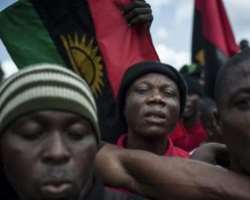Biafra protests are heating up in Nigeria, and human rights activists are worried

Nigeria's security forces must deal cautiously with pro-Biafra protests on Tuesday, a year after dozens were killed in similar protests, Amnesty International has said.
Tuesday marks the 50th anniversary of the declaration of an independent Republic of Biafra , which was formerly a region in southeast Nigeria. The annexation of Biafra by an ex-Nigerian military commander, Odumegwu Ojukwu, sparked a three-year civil war in which at least 1 million people died.
Pro-Biafra activists, including the Indigenous People of Biafra (IPOB), have called for stay-at-home protests in southeast Nigeria to mark what they call Biafra Heroes Day. Supporters of the Biafran cause have shared purported images on social media of empty streets in some southern Nigerian states; many businesses in the states of Anambra and Onitsha were closed Tuesday, Nigeria's Premium Times reported .
During similar commemorations on May 29-30, 2016, Nigerian security forces killed at least 60 and injured 70 pro-Biafra activists , according to a report by Amnesty. Police and soldiers raided a church where activists were sleeping the night before the pro-Biafra rally and carried out several extrajudicial executions on the day of the protests, according to Amnesty. A spokesman for Nigeria's army said at the time that security forces had exercised “maximum restraint” and that the protesters had been violent.
“Last year's heavy-handed response against pro-Biafra activists further stirred up tensions in the southeast of Nigeria,” said Osai Ojigho , the director of Amnesty's Nigeria branch. “We urge the Nigerian security agencies to conduct themselves in a manner that will ensure public order without resorting to force.”
The Nigerian police force said it had put personnel in the affected states on “red alert” and instructed its officers to “deal decisively in accordance with the law” with any disturbances caused by IPOB and other pro-Biafra groups, according to a statement issued Friday.
Newsweek contacted the police headquarters in the capital Abuja to ask if any arrests had been made on Tuesday, but received no immediate reply. On May 22, police arrested at least 55 pro-Biafra protesters in Enugu and Bayelsa states in the south of the country, Reuters reported ; pro-Biafra groups claimed the total was much higher.
Ojukwu's declaration of Biafran independence in 1967 was prompted by waves of persecution of the Igbo—one of Nigeria's three largest ethnic groups, who are concentrated in the southeast—which followed a 1966 coup by army officers, including some who were Igbo.
During its three-year existence, Biafra was largely populated by Igbos. The Nigerian military went to war against the separatists in July 1967 and imposed a blockade on Biafra's borders, which resulted in widespread malnutrition and deaths by starvation.
Pro-Biafra sentiment has increased in recent years, particularly after the arrest of IPOB leader Nnamdi Kanu , a British-Nigerian dual national. Nigerian police arrested Kanu in October 2015 and charged him with several counts of treasonable felony, which carries a maximum sentence of the death penalty in Nigeria. But Kanu was held for almost two years without trial and was released on bail in April.
Nigerian President Muhammadu Buhari, who was a general on the Nigerian side during the Biafran war, has been dismissive of the protests. In October 2016, the president said he was dismayed by demonstrations by “some people who were not even born during the war saying they want to divide Nigeria.”
But Nigeria's Vice-President Yemi Osinbajo—who is the acting president while Buhari is on an indeterminate period of sick leave in the U.K.—made a more delicate plea for unity last week, saying that secession was not the answer to the perceived marginalization of the Igbo ethnic group.
